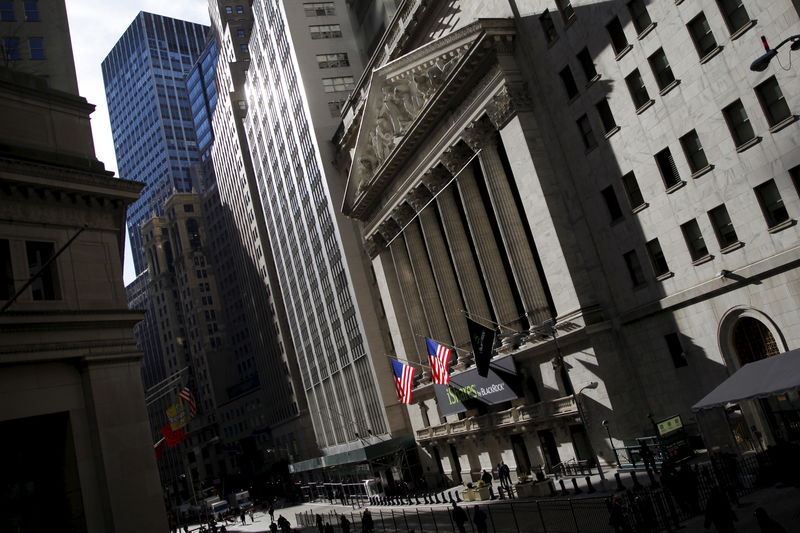By Sujata Rao
LONDON (Reuters) - For some anxious investors, bond markets have lost the plot.
With yields across the developed world in free-fall, markets appear to have convinced central banks that only drastic monetary stimulus can prevent inflation expectations from evaporating for a lifetime. But might those markets be reading it wrong?
If so, policymakers in Japan, euro zone and United States, who are readying interest rate cuts and dusting off the money-printing presses, may end up with a costly error on their hands.
Having spent years chasing a 2% inflation target, these central banks are sufficiently mindful of their credibility to be spooked by what markets are saying. Hence their collective pivot toward easier policy, a U-turn from six months ago.
Nevertheless, plenty of folks are questioning the steer central banks are getting from markets, arguing that inflation outlook is not as dismal as it's painted to be.
"Markets can make mistakes. The bond market may have over-reacted. That does worry me," said Colin Harte of the multi-asset solutions team at BNP Paribas (PA:BNPP) Asset Management.
"A lot of people have expectations of central banks being very accommodative and sensitive to financial markets. There's a danger in that."
The messages from markets are certainly alarming. German 10-year bond yields have fallen past the European Central Bank's -0.4% policy rate. And it is just part of the negative-yielding bond universe globally, a cohort that's worth some $13.5 trillion.
A growing pool of negative-yielding sovereign bonds: https://tmsnrt.rs/2YxEZQo
Investors are now willing to hold U.S. government 30-year debt at 2.4% yield - either a bet that inflation won't accelerate between now 2049 or at least that real, or inflation-adjusted, interest rates will stay close to zero for the next three decades. Either way, it's a dramatic reading of future.
A similar message can be read from market-based future inflation gauges - five-year inflation-linked forward swaps that measure expected euro zone inflation over the five-year period beginning five years from now are near record lows around 1% or almost half the ECB target.
On U.S. 10-year inflation protected securities (TIPs), the "break-even" is around 1.6% which is where traders anticipate prices to be in a decade.
5-year forward inflation swap: https://tmsnrt.rs/2FPeMpe
The problem is markets have often under- or over-estimated future inflation, says Ian Samson, market analyst at Fidelity International. He cited 2013 and 2016 when two-year euro zone forward swaps sharply over-estimated future price growth.
"We may look back on this period and say inflation was under-reported. (U.S) housing and healthcare costs are rising significantly, yet actual reported inflation never seems to rise," said Samson, who predicts prices will "grind higher".
So stumped is the Fed by the 'lowflation' puzzle it's launched a review of how it manages price growth
.
Prominent bond investors such as DoubleLine's Jeffrey Gundlach and Franklin Templeton's Michael Hasenstab have also weighed in, the latter urging policymakers to "at least question the thesis" that inflation has evaporated for ever.
The Fed's inflation problem: https://tmsnrt.rs/2Rv6Aij
WHERE TO LOOK
Critics of markets' dire inflation readings say these fail to capture shifting narratives, such as wage increases and productivity gains delivered by tech innovations.
These are better reflected in surveys such as Purchasing Managers Indexes (PMI) or consumer confidence polls, they argue, because price-setting is influenced by firms and households when they plan investments or purchases rather than by bond traders.
While surveys don't paint a particularly cheerful picture either, Fidelity's Samson says they show "inflation expectations holding up much better than the complete collapse (that breakevens imply)."
U.S. surveys from the University of Michigan and the U.S. Conference Board also seem more optimistic on inflation and consumer confidence than market swaps, while Japanese consumers appear overwhelmingly confident that prices are set to rise.
University of Michigan: https://tmsnrt.rs/2FRy7Gj
Japan consumer confidence: https://tmsnrt.rs/2YxWVu1
In the euro zone, the PMI price component shows that while output prices in manufacturing and services have weakened, they remain in expansion territory. Essentially, that means businesses are more upbeat than markets.
Eurozone output prices: https://tmsnrt.rs/2FVKH7h
In fact, analysis of consumer behavior, PMIs and Economic Sentiment Indicator surveys by Unicredit (MI:CRDI) found that all real economy price gauges are in line with, or above long-term averages. So the economy does not seem to share markets' concern, said Marco Valli, Unicredit's head of macro research.
This divergence, visible in the following chart from Unicredit, was absent in 2015 when ECB kicked off bond-buying or in 2016, when it cut rates to minus 0.40%, he said, noting "a disconnect between market-based expectations and what other surveys are showing us."
Eurozone indicators vs long term averages: https://tmsnrt.rs/2FT9GIs
"If someone told me six months ago the Fed was going to ease policy at current inflation, employment and growth levels I would not have believed it," Valli added.
PAY RISES, NOT PRICE RISES
Labor markets too imply bond traders' pessimism is misplaced.
While wage and employment growth tend to fuel higher prices, that's not happened so far in this cycle even though the developed world is near full employment. Chances are the correlation might be restored as wage growth accelerates.
Sunil Krishnan, head of multi-asset funds at Aviva (LON:AV) Investors points out that U.S. hourly earnings for workers are rising by over 3% on average versus sub-2% in 2014-15, and the euro area's 2.5% wage growth rate is the fastest since 2009.
Markets and policymakers may be underestimating the risk "now that we are in a rising wage environment, inflation may come back quicker and in a stickier way than in the past," Krishnan said.
And any sign of an inflation rebound would force a swift repricing of interest rate risk, triggering a massive bond market reversal.
